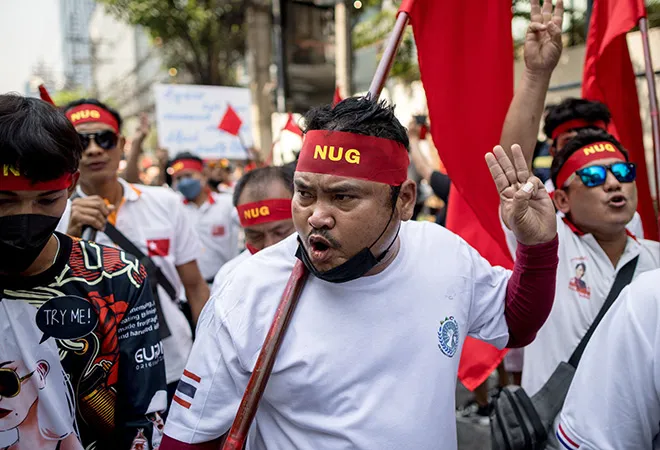
1 February 2023, marks the second anniversary of the military coup in Myanmar. The last two years have been tumultuous due to the ongoing war waged between the civilian population and the Tatmadaw who continue to assert their legitimacy despite facing severe backlash from both national and international audiences.
A silent protest in the form of a strike has been planned by the pro-democracy groups to commemorate this day. Like last year, men, women, and children will be staying home and not participating in their usual daily activities to mark their continued resistance. Like other times, it is anticipated that the military will stage rallies to counter the resistance of the masses.
Since February 2021, over
19,000 have been slaughtered,
13,368 have been detained and
14,73,000 people have been displaced. More than
34,000 religious’ buildings, houses, and educational and medical centres have been destroyed. There continues to be a constant need for humanitarian aid.
A silent protest in the form of a strike has been planned by the pro-democracy groups to commemorate this day.
Domestic scenario
As per the
Special Advisory Council for Myanmar, the Junta has a steady grip over just 17 percent of the population in Myanmar. Interestingly, the People’s Defense Forces (PDFs) are in control of 50 percent while the remaining are still vacillating.
Analysts believe that this is the worst form of violence Myanmar has ever experienced since its independence, spreading to even the most nonviolent area known as the dry zone. The dry zone is an area that is dominated by the Buddhist Bamar majority and military loyalists. This area has traditionally been aloof from experiencing any form of violence that is regularly inflicted upon the ethnic periphery. According to Armed Conflict Location and Event Data Project (
ACLED data), around 650 PDFs are fighting in the dry zone. The overall movement of people has led to the death of several military soldiers.
Subsequently, in early January, the regime has been intensifying airstrikes in Sagaing Region and Chin, Kachin, and Karen states, to subdue movements and pose as a threat to the ethnic armed groups who have vowed to bring the regime down in 2023. It seems like the Junta is struggling to control the disturbed nation.
Now the focus of the military leaders is pinned on the culmination of elections set to be held tentatively in August 2023. According to the military general, this election will supposedly bring back the democratic vigour lacking within the nation. During the celebration of the 75
th year of Myanmar Independence Day, Min Aung Hlaing, the military chief asked for the support of the citizens and the wider international community toward a successful election. Incidentally, the emergency rule is coming to an end on 31
st January (after being renewed twice). As per the 2008 Constitution, the administrative office is
reformulating a new title so that the military generals can continue with their work without any stopgap. Till now the State Administration Council has been the chosen title under which the Junta administration is operating.
The emergency rule is coming to an end on 31st January (after being renewed twice). As per the 2008 Constitution, the administrative office is reformulating a new title so that the military generals can continue with their work without any stopgap.
It has been pointed out by several analysts that trying to hold an election amidst a chaotic environment may lead to more offensives that the military may be incapable of handling in the current situation.
International setting
If the region as a whole is taken into consideration, then 2023 seems to be a tough year for the Junta both domestically as well as globally. In a first-ever move since February 2021 coup, the
United Nations Security Council (UNSC) has been able to approve a resolution demanding an instant termination of all arrangements of violence. It also demands the immediate release of State Counselor Daw Aung San Suu Kyi and President U Win Myint, along with other prisoners. Additionally, it proclaimed the systematic and immediate operationalisation of the Association of Southeast Asian Nations (ASEAN) Five-Point Consensus.
The UNSC is the only UN body with the authority to issue binding resolutions on its member states. This time the resolution was passed without any disagreement from either China or Russia. However, it still lacks proper measures to enforce accountability if one is unable to meet the points mentioned in the resolution. It requires the member nations who can support the people of Myanmar to act in unison to see that the said resolution doesn’t become a dead-end that is followed by more international inaction.
Furthermore, in November 2022, the
Burma Act 2022 passed by the US congress allows the United States to lend technical and nonmilitary assistance to the forces fighting the Junta like the National Unity Government (NUG), and ethnic armed groups as well as PDFs. This provides NUG (the shadow government) and the PDFs with the much-needed muscles to continue their movement.
Moreover, the current chair of ASEAN, Indonesia, holds a strong stance against Myanmar for not adhering to the ASEAN Consensus. It has recently set up an office to monitor the actions of the Junta and to engage with all stakeholders to ensure the peace process is indeed adhered to. The Indonesian Foreign Minister and the current ASEAN Envoy to Myanmar, Retno Marsudi, has stated that the chair
will not allow the Myanmar issue to block the regional bloc’s development but will try to help the people of Myanmar to come out of the crisis. Thus, what action plans the envoy will come up with to control the situation will be important to observe.
The Burma Act 2022 passed by the US congress allows the United States to lend technical and nonmilitary assistance to the forces fighting the Junta like the National Unity Government (NUG), and ethnic armed groups as well as PDFs.
Despite the above steps the military offensives have continued. Even after the UNSC ruling. the military court sentenced the
ex-state counsellor to seven more years in prison bringing the total count to 33 years. Also, the ex-president has been moved to Taungoo prison in mid-January 2023 bringing his total count to 12 years. The war against the masses is ongoing in full force with no sign of abatement. Last week, the
Junta bombed a monastery sheltering displaced people. Also, appropriating resources and not allowing relief to reach the people in need has become typical. Thus, the chances that the Junta will follow international or regional orders seem to be slim at the moment. If both 2021 and 2022 are any clue, then the Junta will continue to act in the way it deems appropriate and will continue to disregard or pick and choose points that seem suitable for its own ends.
But there remains hope that much of the dynamics are going to change in 2023 with the unrelenting surge of the people’s movement, the UNSC ruling, the Burma Act 2022, and ASEAN’s new chair. Whether it will lead to the appropriate result of bringing a democratic regime back to power without any military influence is yet to be seen.
The views expressed above belong to the author(s). ORF research and analyses now available on Telegram! Click here to access our curated content — blogs, longforms and interviews.



 1 February 2023, marks the second anniversary of the military coup in Myanmar. The last two years have been tumultuous due to the ongoing war waged between the civilian population and the Tatmadaw who continue to assert their legitimacy despite facing severe backlash from both national and international audiences.
A silent protest in the form of a strike has been planned by the pro-democracy groups to commemorate this day. Like last year, men, women, and children will be staying home and not participating in their usual daily activities to mark their continued resistance. Like other times, it is anticipated that the military will stage rallies to counter the resistance of the masses.
Since February 2021, over
1 February 2023, marks the second anniversary of the military coup in Myanmar. The last two years have been tumultuous due to the ongoing war waged between the civilian population and the Tatmadaw who continue to assert their legitimacy despite facing severe backlash from both national and international audiences.
A silent protest in the form of a strike has been planned by the pro-democracy groups to commemorate this day. Like last year, men, women, and children will be staying home and not participating in their usual daily activities to mark their continued resistance. Like other times, it is anticipated that the military will stage rallies to counter the resistance of the masses.
Since February 2021, over  PREV
PREV


